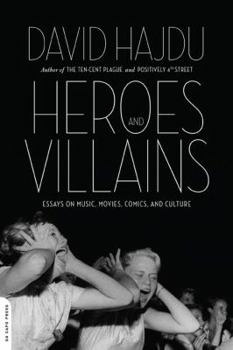Heroes and Villains: Essays on Music, Movies, Comics, and Culture
Select Format
Select Condition 
Book Overview
Heroes and Villains is the first collection of essays by David Hajdu, award-winning author of The Ten-Cent Plague , Positively 4th Street , and Lush Life . Eclectic and controversial, Hajdu's essays take on topics as varied as pop music, jazz, the avant-garde, comic books, and our downloading culture. The heart of Heroes and Villains is an extraordinary new piece of cultural rediscovery, original to this book. It tells the untold story of one of the...
Format:Paperback
Language:English
ISBN:0306818337
ISBN13:9780306818332
Release Date:October 2009
Publisher:Da Capo Press
Length:352 Pages
Weight:0.95 lbs.
Dimensions:0.9" x 6.3" x 9.0"
Customer Reviews
1 rating
Heroes, but few villains
Published by Thriftbooks.com User , 14 years ago
In this collection of essays, mostly about music, David Hajdu doesn't hold back from expressing strong opinions about artists and their work. But they're informed opinions. For instance, he doesn't do "irresistibly catchy" singer Taylor Swift any favors by quoting her accurately when she says that Shakespeare's Romeo and Juliet "could have been the best love story ever told" if it had had a different ending. Several themes run through the book, making it more interesting than just a collection of magazine pieces that happened to be available for reprint. One idea Hajdu comes back to is that rock and roll music doesn't grow up. (That's why it can never die, I guess.) Unfortunately the rockers get older even if the music doesn't, and if they don't learn new things they cease to be interesting. "Rock, at its crude best, is a music of disgrace, anathema to aging . . . gracefully." Another theme that recurs is the idea of a musical standard that began to be less revered in pop music after the British Invasion. The idea that "old-fashioned popular music was so atrocious in the mid-1950s that Elvis had to come forth for pop's salvation" is merely musical history written by the teenage winners of the generational wars. Hajdu gives examples of how "jazz-oriented popular music reached a creative peak" at the same time rock was born. Another image that Hajdu finds repeating in popular music is the black man as sexual predator. Louis Armstrong projected an childlike image and pleased everybody. Billy Eckstine, who at one time sold more albums than Frank Sinatra or Bing Crosby, was photographed with ecstatic young white female fans and his career suffered. I think Hajdu is too quick to accept the notion of substance abuse as a necessary part of the makeup of artists like Anita O'Day. (She makes "enchanting, mercurial music" when drunk, and she "did her greatest, most enduring, . . . work while she was stoned out of her mind..") From the pre-rock era, Hajdu covers Duke Ellington, Rodgers and Hart, Rodgers and Hammerstein, Sammy Davis, Jr., Bobby Darin, Susannah McCorkle, Leadbelly, Alan Lomax (along with Sting, the closest thing to a villain in the book), Dinah Washington, and Ray Charles. Then come Elvis Costello, Brian Wilson, the White Stripes, Mos Def, and many more. The main thing I took from this book is that artistic ideas arise in reaction to other artistic ideas, and that the new reaction often isn't new at all. As cult inventor-composer Harry Partch says, "What this age needs more than anything is an effective antidote." If David Hajdu is right, there will always be an antidote.





